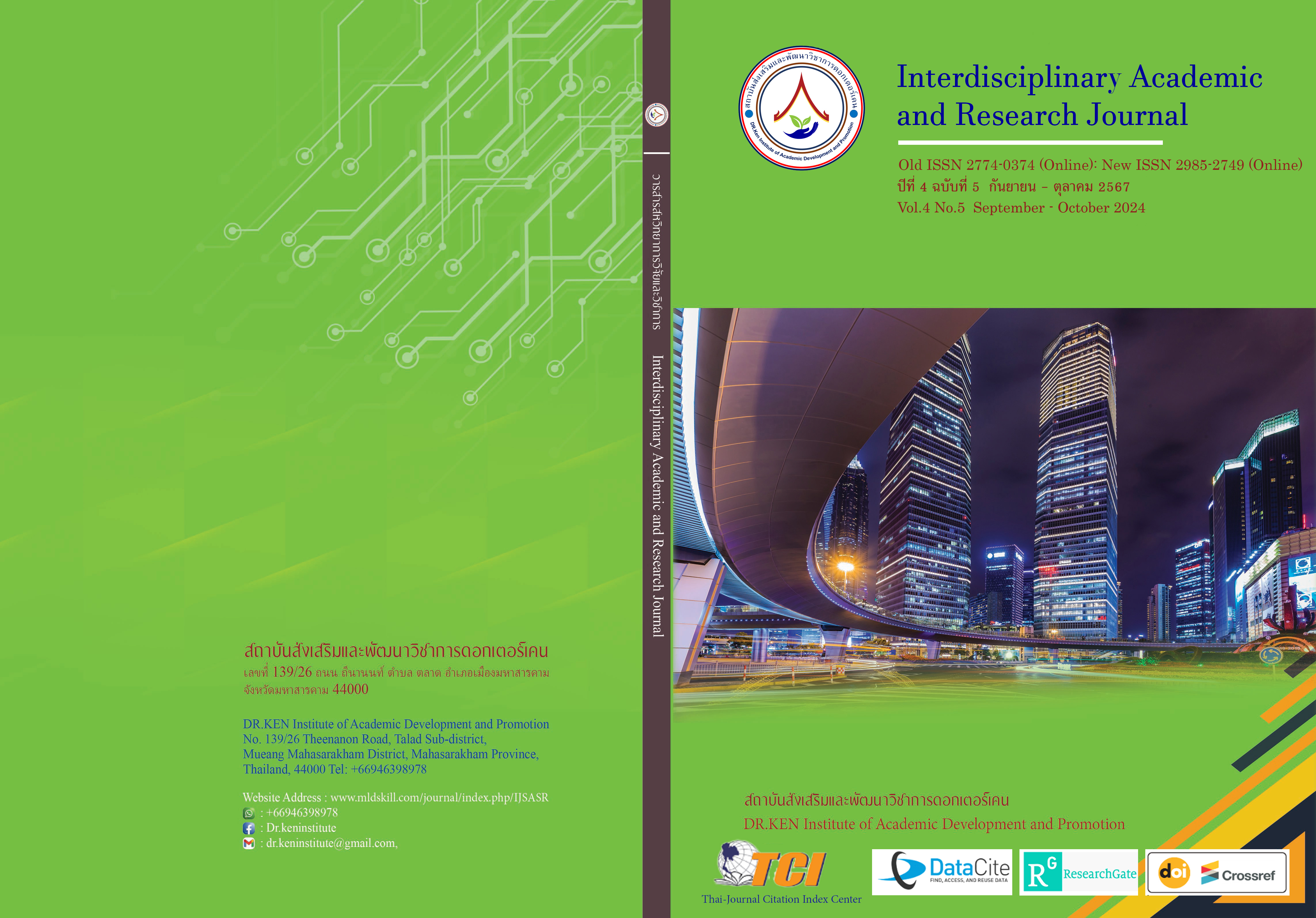Community Rights Defiance: Case Study Gold Mine in Chanthaburi Province
DOI:
https://doi.org/10.60027/iarj.2024.281782Keywords:
Community rights protection, , Community rights, , Gold miningAbstract
Background and Aims: Community rights protection involves the community’s authority to manage natural and human-made resources to preserve, restore, and sustainably manage them for long-term viability. This research has three key objectives: 1) to examine the enforcement of laws in the gold mining industry, 2) to study and analyze lessons from the public sector’s efforts in protecting community rights, and 3) to propose legal measures for enhancing community participation in gold mining activities. The research employs a qualitative approach, drawing on documentation and social media data. It focuses on the movement "Chanthaburi People Do Not Accept Mining," which opposes gold mining in Chanthaburi Province, to extract public lessons from this movement. Data analysis was conducted using descriptive content analysis.
Methodology: This study analyzes the challenges in law enforcement arising from gold mining operations that impact community rights. A qualitative approach is employed, utilizing documentary research to collect and analyze various sources, including laws, textbooks, journals, research reports, theses, online publications, and case studies related to the topic.
Results: The study found that protecting community rights in the context of the gold mining industry remains a contentious issue, leading to protests in Chanthaburi Province. Despite existing laws, they need to address community rights protection adequately. Weak enforcement of regulations related to gold mining has resulted in violations of these rights, negatively affecting natural resources, the environment, and the well-being of local residents.
Conclusions: The movement of communities impacted by gold mining operations in Chanthaburi Province follows a structured process that effectively influences business operators. It also aims to empower the community by raising awareness and educating its members about their rights and how to protect these rights in the future.
References
กระทรวงยุติธรรม กรมคุ้มครองสิทธิและเสรีภาพ. (2566). แผนปฏิบัติการระดับชาติว่าด้วยกฎหมายธุรกิจกับสิทธิมนุษยชน ระยะที่2 (พ.ศ. 2566-2570). Retrieved on 29 November 2023 From: https://shorturl.asia/dtvJe
ฐากูร สรวงศ์สิริ และมณีมัย ทองอยู่. (2553). ขบวนการเคลื่อนไหวทางสังคมคัดค้านเหมืองแร่โพแทช จังหวัดอุดรธานี. วารสารมหาวิทยาลัยขอนแก่น, 10(4), 135-150.
ณัชฌา ลงทอง. (2564). ประสบการณ์ทางจิตใจของนักเคลื่อนไหวรุ่นใหม่. วิทยานิพนธ์ ศิลปศาสตรมหาบัณฑิต สาขาวิชาจิตวิทยา คณะจิตวิทยา จุฬาลงกรณ์มหาวิทยาลัย.
ธนิกา เนาวรัชต์ และชุลีรัตน์ เจริญพร .(2563). การเคลื่อนไหวทางสังคมแนวใหม่ในการคัดค้าน โครงการโรงไฟฟ้าจากก๊าซธรรมชาติบางคล้า. วารสารนวัตกรรมสังคม, 3 (1), 106-120.
ประชาชาติธุรกิจ.(2563). จันทบุรีแสดงพลังยื่น 160,000 รายชื่อคัดค้านขออาชญาบัตรพิเศษแร่ทองคำ. Retrieved on 10 July 2024. From : https://www.prachachat.net/local-economy/news-518691
ประภาส ปิ่นตบแต่ง. (2552). กรอบการวิเคราะห์การเมืองแบบทฤษฎีขบวนการทางสังคม. เชียงใหม่: มูลนิธิไฮน์ริค เบิลล์ สำนักงานภูมิภาคเอเชียตะวันออกเฉียงใต้.
ปริษา จารุวาระกุล. (2550). ไซยาไนด์กับอุตสาหกรรมเหมืองแร่ทองคำ. กรุงเทพฯ: กลุ่มอุตสาหกรรมพื้นฐาน 4 สำนักอุตสาหกรรมพื้นฐาน กรมอุตสาหกรรมพื้นฐานและการเหมืองแร่.
พงศ์เสวก เอนกจำนงค์พร และ นวพร ศิริบันเทิงศิลป์. (2555).สิทธิชุมชนกับการแก้ปัญหาความเหลื่อมล้ำในสังคมไทย. Executive Journal, 32(1),183-189.
ภิรัชญา วีระสุโข. (2559). จิตสำนึกในการอนุรักษ์และการพึ่งพิงตนเอง: อัตลักษณ์ของกลุ่มอนุรักษ์ ทรัพยากรธรรมชาติและสิ่งแวดล้อมบ้านกรูด-บางสะพาน จังหวัดประจวบคีรีขันธ์. วารสารสงขลานครินทร์ ฉบับสังคมศาสตร์และมนุษยศาสตร์, 22(3), 133-173.
มูลนิธินิติธรรมสิ่งแวดล้อม. (2563). ความเห็นทางกฎหมาย: การขออาชญาบัตรพิเศษสำรวจแร่ทองคำจังหวัดจันทบุรี. Retrieved on 18 August 2024. From https://enlawfoundation.org/chanthaburi-goldmining-opinions/
สำนักงานคณะกรรมการสิทธิมนุษยชนแห่งชาติ. (2561). คู่มือประเมินความเสี่ยงด้านสิทธิมนุษยชนอย่างรอบด้านและรายการตรวจสอบของภาคธุรกิจ. กรุงเทพมหานคร: สำนักงานคณะกรรมการสิทธิมนุษยชนแห่งชาติ.
สำนักงานเลขาธิการสภาผู้แทนราษฎร.(2563). สิทธิชุมชน. กรุงเทพมหานคร: สำนักงานเลขาธิการสภาผู้แทนราษฎร.
อรทัย อินต๊ะไชยวงค์.(2560). สิทธิชุมชนในการจัดการทรัพยากรธรรมชาติและสิ่งแวดล้อมเพื่อการพัฒนาที่ยั่งยืน : ศึกษาความเหมาะสมของการใช้ทฤษฎีของ Elinor Ostrom ในประเทศไทย , วิทยานิพนธ์ นิติศาสตรดุษฎีบัณฑิต คณะนิติศาสตร์ สถาบันบัณฑิตพัฒนบริหารศาสตร์.
United Nations. (2021). A clean environment is a human right, the UN Council agrees. Retrieved on 10 July 2024 from: https://www.theguardian.com/world/2021/oct/08/clean-environment-is-a-human-right-un-council-agrees.
Downloads
Published
How to Cite
Issue
Section
License
Copyright (c) 2024 Interdisciplinary Academic and Research Journal

This work is licensed under a Creative Commons Attribution-NonCommercial-NoDerivatives 4.0 International License.
Copyright on any article in the Interdisciplinary Academic and Research Journal is retained by the author(s) under the under the Creative Commons Attribution-NonCommercial-NoDerivatives 4.0 International License. Permission to use text, content, images, etc. of publication. Any user to read, download, copy, distribute, print, search, or link to the full texts of articles, crawl them for indexing, pass them as data to software, or use them for any other lawful purpose. But do not use it for commercial use or with the intent to benefit any business.
















.png)


